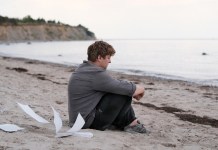

To mark the impending release of Niall MacCormick’s debut feature film, HeyUGuys caught up with rising actress Brown-Findlay to talk briefly about her first role as leading lady, the differences between Emilia and Lady Sybil, the character she plays on Downton Abbey, and what she loved so much about this quirky British comedy.
___________
HeyUGuys: What initially drew you to Albatross?
Jessica Brown-Findlay: It really excited me. It felt honest, and also, you know, out of the ordinary. It was just irresistible – I couldn’t turn down the offer.
When you think of coming-of-age, you think of a schmaltzy Hollywood production, but I think what Tamzin tried to do was quite original and exciting – making three dimensional characters that you could actually believe in.

Yeah, I think so, and that’s what was so nice. It wasn’t about “boy meets girl, girl meets boy, boy hates girl, girl hates boy”, it was more about family, their dynamics, and how they all functioned or didn’t function with one another. It felt really honest, which was great.
The character you play in Albatross, Emilia, is quite different to the one you play in Downton Abbey, Lady Sybil. Was it difficult to get into Emilia’s mindset and differentiate her from Sybil?
Well, I mean, I think they both share a similarity in their rebellion, I suppose. Sybil is considered to be much more well-to-do and methodical in her actions. Whereas, Emilia, not so much and, she subsequently, goes in thinking she knows it all only to discover she doesn’t. They’re both very much at a crossroads in their lives, and the journeys in which they both embark on will have repercussions for the rest of their lives.


The wonderful thing about Albatross is that we had about a week of rehearsals which, with the enormous cast on Downton Abbey, would’ve been impossible. Albatross was different, in terms of timescale and how many scenes you’re shooting per day. And obviously, in a film, you’re telling an entire story within, you know, an hour and a half, so it’s crucial to be as spot as you can on the first time, because you don’t have the luxury of revisiting ideas, etc. Whereas, in something like Downton Abbey, you go on numerous journeys or tell numerous storylines within a series – or a number of series – so it lets you tell a more detailed story over a longer period of time.
I think Tamzin did that in a very interesting way. Rather than explaining Emilia’s background right at the start, and ramming so much information down viewers’ throats, she let it filter out as the narrative developed.
Yeah, that was wonderful. It worked so well and even changed the tone of the film, so that, after that initial “Oh, okay. I get what’s she’s about”, the ideas about her personal life are completely subverted when she puts the key in the door and her family life is presented so honestly, showing that her life isn’t remotely what people expect it to be like – she leads a far more lonely and steadfast existence then we could have possibly imagined. It shows that the assertive, ballsy personality she so cleverly puts on is there as a defence mechanism – a way to mask her true self and, in a way, to protect her.
Thank you very much for your time, Jessica.
Albatross hits U.K. cinemas on October 14. Click here to read my review.






